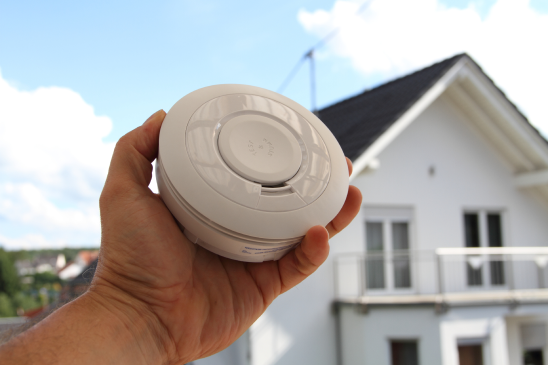Home » Carbon Monoxide Poisoning
San Antonio’s Fiercest Carbon Monoxide Poisoning Lawyers are Prepared to Fight for You
CO Poisoning Is Preventable; We Hold Negligent Parties Accountable In Texas
If you’ve suffered carbon monoxide poisoning from a malfunctioning heater in your apartment, a faulty boiler in a hotel, during a power outage, or another scenario you’re facing a serious crisis. The San Antonio carbon monoxide poisoning lawyers at the Wyatt Law Firm are ready to fight for your rights and secure the justice and compensation you need. We handle cases throughout Texas.



In Texas, landlords, manufacturers, daycares, hotels, hospitals, and other entities have a legal duty to protect the public from the dangers of carbon monoxide. When they fail in this duty, the consequences can be fatal or lead to permanent disabling injuries like:
- Brain damage
- Heart attacks
- Lung damage
- Hearing or vision loss
- Paralysis
We are fiercely dedicated to holding these parties accountable to victims and their families.
Maximum compensation
for Texas CO injuries
With more than 40 years of experience and over $1 billion recovered for our clients, The Wyatt Law Firm is the right place to come if you or a family member were injured or killed by CO exposure. Based in San Antonio, our case results in Bexar County and South Texas include:
Free CO poisoning case consultation
If you or a loved one has been harmed by carbon monoxide poisoning, you deserve justice. Contact the Wyatt Law Firm for a free case consultation. A member of our team is available 24/7 to hear from you. We can listen to the details of what happened, answer questions, explain your legal options, and help you decide what to do next. There is no charge or obligation to hire – Just information you can trust from a law firm that’s been fighting for Texas CO victims for more than 40 years.
Meet Wyatt Law Firm
Trusted By Texans For 40+ Years



What are common sources
of CO poisoning?
- Space Heaters
- Furnaces
- Gas Water Heaters
- Stoves and Ovens
- Fireplaces (Gas and Wood-Burning)
- Kerosene Heaters
- Portable Generators
- Cars and Trucks in Attached Garages
- Gas Dryers
- Industrial Equipment (e.g., Forklifts, Power Washers)
- Failure to Properly Install or Maintain Apartment/Rental Unit CO Detectors
- Failure to Properly Install or Maintain Apartment/Rental Unit Appliances
- Local Health and Safety CO Code Violations
Fighting for the
compensation you deserve
If you suffered carbon monoxide poisoning due to someone’s negligence, you may have the right to seek compensation for your injuries. Pursuing a carbon monoxide poisoning lawsuit involves proving premises liability – a complex and unforgiving area of the law. Your lawyer must demonstrate that the defendant owed you a duty of care, breached that duty, that their negligence directly caused your injuries, and these injuries resulted in serious damages such as:
- Lost wages
- Pain and suffering
- Medical costs to treat the injury
- Emotional distress
- Impairment
- Loss of enjoyment of life
Every loss one potentially can experience from CO poisoning is also a basis for recovery in the legal context, as long as you have the right attorney by your side.
Fatal carbon monoxide
exposure lawsuit
Texas law allows families to file a lawsuit when their loved one passes away due to negligence. Many carbon monoxide cases are filed as wrongful death lawsuits. Claims resulting from a fatal carbon monoxide poisoning incident aim to compensate surviving family members for the tragic losses they suffered. If your lawyer can prove that their loved one died because of someone else’s negligence, they can receive:
- The lost earning capacity from the deceased
- The loss of emotional support that the deceased would have provided
- The mental pain and anguish suffered by the family
- The lost love, care, and companionship
Don’t face this alone —
Contact us to get your CO exposure case started now
If you or a loved one has suffered from carbon monoxide poisoning due to negligence, act now. Contact the Wyatt Law Firm in San Antonio for a free case evaluation. Our fierce and experienced carbon monoxide poisoning lawyers are dedicated to fighting relentlessly for your rights and securing the maximum compensation you deserve. Don’t face this alone — let us put our best attorneys to work for you.
At Wyatt Law Firm we are committed to empowering accident victims and the greater San Antonio community.
If you suspect carbon monoxide poisoning, do not wait for them to appear ill to act. Immediately move the person to fresh air and call the Texas Poison Network’s 24/7 Hotline – 800.222.1222 – for medical referral services staffed by specially trained physicians, pharmacists, and nurses. If they’re unconscious, call 911 right away.
- San Antonio Fire Department, for prevention and testing. Phone – 210.207.8422
- R3 Wound Care TX, provides CO illness rehabilitation services at various locations throughout Texas. Stone Oak Clinic, 18626 Hardy Oak Blvd, Suite 10, San Antonio, TX 78258. Phone – 210.745.7973
- Poison Control, CO poisoning information
- Mayo Clinic, CO poisoning information
Reduce the risk of carbon monoxide
exposure tips by CPS Energy
- Install Carbon Monoxide Detectors. Place detectors near sleeping areas to alert you to dangerous CO levels.
- Replace Batteries Twice a Year. Replace detector batteries when you change your clocks for daylight saving time each spring and fall.
- Ensure Proper Use and Ventilation. When using gas space heaters, leave a window open to ensure adequate airflow. Do not use gas ranges, ovens, or clothes dryers to heat rooms. Avoid using charcoal grills, barbecue grills, or portable gas camp stoves inside.
- Clear Vents and Chimneys. Keep vents and chimneys free of debris to prevent CO buildup.
Reclaim your power
with Wyatt Law Firm
Carbon monoxide poisoning can cause severe, life-altering injuries or even death. If you’ve been affected, reach out to the Wyatt Law Firm in San Antonio for a free case evaluation. We want to help you make informed decisions that protect your health and financial future. Our dedicated attorneys are committed to fighting aggressively for your maximum results and holding negligent parties accountable. Trust our experience to get you the justice and compensation you need. Contact us today.
Space Heaters
Gas-powered space heaters produce CO when used in enclosed or poorly ventilated spaces, especially during the cold season. Exposure can lead to flu-like symptoms, cognitive impairment, and death. Victims can pursue claims against property owners for unsafe conditions, manufacturers for inadequate warnings, or retailers for failing to provide proper usage instructions. Wyatt Law Firm is committed to holding negligent parties accountable and securing maximum compensation for our clients’ physical, mental, and financial recovery. Return to TopFurnaces
Faulty gas furnaces, like those with cracked heat exchangers, can produce CO due to incomplete combustion. This risk is heightened during winter when furnaces are in constant use. Prolonged exposure can cause headaches, dizziness, and severe neurological damage, even death. Victims can pursue legal action against property owners for failing to maintain the furnace, HVAC contractors for improper installation, and manufacturers if the furnace is defective. At Wyatt Law Firm, San Antonio’s fiercest legal team, we fight relentlessly to hold these parties accountable and secure full recovery — physically, mentally, and financially — for our clients. Return to TopGas Water Heaters
Blocked ventilation or improper adjustment of gas water heaters can cause CO leaks, often due to poor installation or lack of regular inspections. Acute exposure can lead to nausea, confusion, and loss of consciousness, while chronic exposure can exacerbate existing conditions and potentially cause brain damage or death. Victims can file claims against property owners, plumbers, and manufacturers. Wyatt Law Firm is dedicated to investigating every detail, from installation practices to maintenance records, to ensure our clients receive maximum compensation and justice. Return to TopStoves and Ovens
Incomplete combustion from clogged burners or poor ventilation in gas stoves and ovens can produce CO, especially in poorly ventilated kitchens. Exposure can result in headaches, dizziness, fatigue, and long-term cognitive impairments. Victims may seek compensation from property owners for failing to maintain appliances, installers for improper setup, or manufacturers for defective products. The experienced attorneys at Wyatt Law Firm work tirelessly to prove negligence, ensure accountability, and secure comprehensive recovery for our clients in San Antonio. Return to TopFireplaces (Gas and Wood-Burning)
Fireplaces, particularly with blocked chimneys or flue issues, can produce CO, commonly occurring in homes with infrequent chimney cleanings or improperly installed gas log sets. CO exposure can cause respiratory issues, cardiovascular problems, and severe poisoning symptoms, sometimes leading to fatal accidents. Victims can sue property owners, contractors, or manufacturers. Wyatt Law Firm’s commitment to justice means thoroughly examining maintenance records, consulting experts, and pursuing maximum compensation for our clients. Return to TopKerosene Heaters
Kerosene heaters can produce CO, especially when used in enclosed spaces or if they malfunction. Exposure can cause confusion, weakness, chest pain, and severe poisoning, leading to unconsciousness or death. Victims can file claims against property owners, manufacturers of defective heaters, or users who misused the heaters. Wyatt Law Firm’s fierce dedication to our clients drives us to investigate every aspect of the case, from ventilation conditions to safety warnings, ensuring our clients receive the full compensation they deserve. Return to TopPortable Generators
Portable generators can produce dangerous CO levels if used indoors, in garages, or near windows, particularly during power outages. CO poisoning can cause dizziness, confusion, and loss of consciousness, potentially leading to death within minutes. Victims may have claims against property owners, manufacturers for insufficient safety warnings, and contractors for faulty installation advice. Wyatt Law Firm’s relentless pursuit of justice involves gathering crucial evidence, scrutinizing generator usage, and fighting for our clients’ complete recovery. Return to TopCars and Trucks in Attached Garages
Vehicle exhaust in enclosed or poorly ventilated garages can lead to CO buildup, especially in homes with attached garages or workplaces with inadequate ventilation. CO poisoning can cause confusion, chest pain, and sudden loss of consciousness, potentially leading to death within minutes. Victims can sue property owners, employers, or vehicle manufacturers. Wyatt Law Firm’s experienced team investigates every angle, from garage ventilation to safety protocols, ensuring our clients receive the justice and compensation they deserve. Return to TopGas Dryers
Gas dryers can produce CO if exhaust vents are blocked or the unit is improperly installed, often in older homes or buildings. CO exposure can cause dizziness, shortness of breath, and in severe cases, unconsciousness or death. Victims can file legal action against property owners, installers, or manufacturers. Wyatt Law Firm’s fierce approach to justice involves meticulously examining the condition of the dryer, maintenance history, and installation issues, fighting for our clients’ full recovery. Return to TopIndustrial Equipment (e.g., Forklifts, Power Washers)
Industrial equipment running on fuel in enclosed spaces, such as warehouses or factories, can produce CO. CO poisoning in these settings can lead to headaches, confusion, fainting, and long-term neurological damage. Victims can pursue claims against employers for inadequate safety protocols, manufacturers for defective equipment, and site managers for failing to ensure proper ventilation. Wyatt Law Firm’s unwavering dedication to our clients involves thoroughly investigating workplace safety, identifying negligence, and securing the compensation needed for a full physical, mental, and financial recovery. Return to TopFailure to Properly Install or Maintain Apartment/Rental Unit CO Detectors
Failing to install a carbon monoxide detector puts tenants at grave risk, as they have no warning system for deadly CO exposure. When landlords neglect this crucial safety measure, the consequences can be catastrophic, leading to severe injuries or fatalities. In San Antonio, where strict regulations mandate CO detectors, failure to comply is not only a violation of the law but also a breach of duty to tenants. Wyatt Law Firm, San Antonio’s fiercest legal team, will hold landlords accountable for this negligence. We are committed to securing full recovery — physical, mental, and financial — for those affected by this reckless oversight. Return to TopFailure to Properly Install or Maintain Apartment/Rental Unit Appliances
Landlords have a legal duty to ensure that appliances, such as heaters or stoves, are properly maintained to prevent hazardous conditions. A failure to maintain these appliances can result in dangerous carbon monoxide leaks, leading to life-threatening injuries or death. This negligence not only violates the lease agreement but also endangers the health and safety of tenants. Wyatt Law Firm stands ready to fight for the rights of victims who have suffered due to a landlord’s failure to maintain safe premises. As San Antonio’s most dedicated legal advocates, we pursue maximum compensation to ensure full recovery — physically, mentally, and financially — for our clients. Return to TopLocal Health and Safety CO Code Violations
Landlords and property managers are required by law to adhere to local health and safety codes, including the proper installation and maintenance of appliances and safety devices like carbon monoxide detectors. When these codes are ignored, tenants are placed in unnecessary danger, risking exposure to carbon monoxide and other hazards. This failure to follow legal standards is not just a violation of the law but also a grave negligence that can lead to serious harm or death. Wyatt Law Firm, known for its fierce dedication in San Antonio, will take decisive legal action against those who put lives at risk by disregarding safety codes. We are committed to ensuring our clients achieve full recovery — physical, mental, and financial — by holding negligent parties fully accountable. Return to TopRelated Pages
